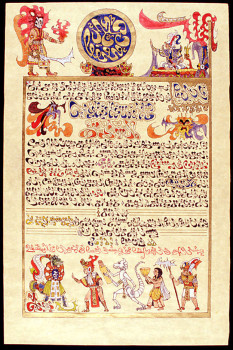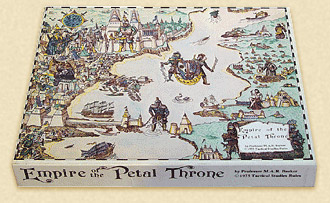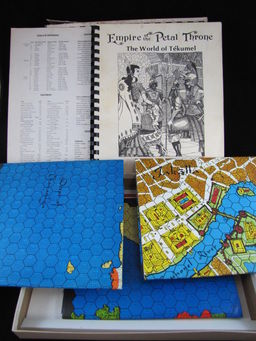Securing Gamer Posterity
 The hobby of tabletop roleplaying games officially kicked off in early 1974, with the publication of Gary Gygax and Dave Arneson’s Dungeons & Dragons. 2014, which is right around the corner, is thus the 40th anniversary of both D&D and the hobby to which it gave birth. Think about that for a moment: people have been rolling polyhedral dice and pretending to be knights and wizards for nearly four decades. If I didn’t already feel old, that fact certainly would have made feel so.
The hobby of tabletop roleplaying games officially kicked off in early 1974, with the publication of Gary Gygax and Dave Arneson’s Dungeons & Dragons. 2014, which is right around the corner, is thus the 40th anniversary of both D&D and the hobby to which it gave birth. Think about that for a moment: people have been rolling polyhedral dice and pretending to be knights and wizards for nearly four decades. If I didn’t already feel old, that fact certainly would have made feel so.
Though RPGs are still going strong after all these years, the same cannot, unfortunately, be said of many of its founding figures. We lost Gary Gygax in 2008 and Dave Arneson the following year. Many more have followed in the years since, several of whom have been noted here at Black Gate. Many others are still with us, of course; it’s my hope that we’ll take the time to honor and, above all, thank them for their contributions to our lives while we still have the chance to do so. I can’t speak for anyone else, but I have been endlessly enriched and improved because of that boxed set I cracked open at Christmas 1979. I cannot begin to imagine how different the course of my life might have run if it had not been for this crazy hobby. Roleplaying games have truly had a huge impact in making me the person I am today. I doubt I am alone in feeling this way.
Given the importance RPGs have played in so many lives and how influential roleplaying games, both as entertainments and as creative endeavors, have become, I don’t think it’s at all unreasonable to want to see their history preserved for the benefit of future gamers – and historians, some of whom will undoubtedly find value in exploring how a bunch of “let’s pretend” games came to be the wellsprings of so much of contemporary popular culture. Sadly, this hasn’t been the case. There’s no Gygax Collection at the University of Chicago nor are the Arneson Papers safely lodged at the Elmer L. Andersen Library at the University of Minnesota. If you’re interested in piecing together the early history of the hobby – and the individuals who helped create it – you’ll likely have to rely on much more scattered resources to do so, assuming you can find them at all.
Unless you’re interested in M.A.R. Barker and his fantasy world of Tékumel, that is.
 Professor Barker wrote one of the earliest and, to my mind, most interesting roleplaying games, Empire of the Petal Throne, first published by TSR in 1975. Unlike D&D, which is a “generic” medieval fantasy game without an integral setting, EPT describes the alien planet of Tékumel as its setting.
Professor Barker wrote one of the earliest and, to my mind, most interesting roleplaying games, Empire of the Petal Throne, first published by TSR in 1975. Unlike D&D, which is a “generic” medieval fantasy game without an integral setting, EPT describes the alien planet of Tékumel as its setting.
Colonized by humans from Earth tens of thousands of years in our future, Tékumel suffers an inexplicable cataclysm that plunges it and its inhabitants into a spatial void where the laws of physics work differently than those in our reality. Amidst the ruins of this advanced, technological society, magic becomes possible, as does congress with extra-dimensional beings that are, for all intents and purposes, gods.
Barker originally created Tékumel as a young man, revising and expanding it throughout the 1940s and ’50s, as he became involved in the growing fandom of science fiction and fantasy. When he encountered D&D while a professor at the University of Minnesota, he quickly realized that he had the vehicle for further exploring Tékumel and its mysteries.
 From the 1970s until shortly before his death last year, Professor Barker regularly roleplayed in the the world of Tékumel, creating mounds of setting information, including maps, character descriptions, artwork, several constructed languages, and five novels. Very little of this was ever formally published. Much of it was never seen even by his regular group of players, although Barker himself used it as source material for his own writings and gaming sessions.
From the 1970s until shortly before his death last year, Professor Barker regularly roleplayed in the the world of Tékumel, creating mounds of setting information, including maps, character descriptions, artwork, several constructed languages, and five novels. Very little of this was ever formally published. Much of it was never seen even by his regular group of players, although Barker himself used it as source material for his own writings and gaming sessions.
Before his death, however, Professor Barker ensured that this material would be preserved through the creation of The Tékumel Foundation, a non-profit corporation whose mission “is to encourage, support and protect the literary works and all related products and activities surrounding Professor M.A.R. Barker’s world of Tékumel and the Empire of the Petal Throne.”
The Foundation is currently in the midst of gathering, protecting, and cataloging Professor Barker’s papers and possessions of interest, as recounted on its blog. This work ensures that the vast library of material Barker created will survive him, enabling future generations, both gamers and academics, to benefit from it. While the majority of the items in the Foundation’s collection have connections to the roleplaying hobby, some have even wider interest, such as his correspondence with science fiction and fantasy authors, like Jack Vance and Lin Carter, and materials relating to the early days of SF/F fandom.
Professor Barker lived a long and fascinating life. He came of age in the early 1950s, just as science fiction and fantasy began to take off (he attended WorldCon 8, for example) and was one of the earliest designers of a fantasy roleplaying game. He is thus a unique figure and, thanks to the work of The Tékumel Foundation, the fruits of his life can be preserved.
Would that we could say the same about more of the founders of our hobby!
The fact that this exists makes me inexpressibly happy.